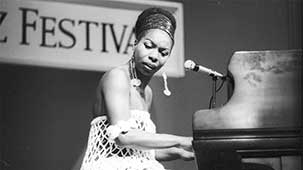When trying to tell the story of someone who was a musical genius, a ground-breaking artist, and an African-American icon, where does one even begin? Nina Simone’s career and personal life had so many ups and downs that it must have been near impossible to choose an appropriate jumping off point for the documentary, What Happened, Miss Simone?. I’m sure it was especially difficult for you, not just as a producer and an interview subject, but as Nina Simone’s only child.
Like Kurt Cobain: Montage of Heck, this is an unflinching documentary produced by the daughter of its subject. But Kurt’s daughter, Francis Bean Cobain, was almost two when she lost her father, and has had to construct a one-sided relationship with her famous musician parent. You, Lisa, have a lifetime of less than happy memories to inform your relationship with the legend you knew as mom. Kurt Cobain is worshiped as a grunge deity. But your mother’s musical legacy is even more significant. With this film, Nina SImone – the woman and the artist – finally gets the veneration she so richly deserves.
What Happened, Miss Simone? begins with footage from the 1968 Montreux Jazz Festival in Switzerland. Your mother walks out to cheers and applause, but seems ill at ease, possibly under the influence of medication, and definitely unsure of herself. She looks offstage, as though she’s waiting to be told what to do. She speaks awkwardly, and stares blankly. It is both utterly compelling and deeply unsettling. But it is a fascinating way to begin to tell the story of a powerful woman who was constantly searching for, but was unable to find, true freedom.
You were born into better circumstances than your mother was in 1933. She displayed a talent for classical piano at a very young age in segregated North Carolina, and with the help of wealthy white benefactors, she eventually made her way to the Julliard School of Music in New York City. Only when she was denied acceptance to the Curtis School of Music in Philadelphia did she change her name and pursue a career as a nightclub entertainer in order to support her family. She only began to sing when prompted by a club owner. She rocketed to stardom when she met your father, who became her manager. In fact, the more we learn about your mother, the more it seems her life was shaped largely by the choices made for her by others.
As a producer, your day revolves around making choices, both big and small. Sifting through the refreshingly candid footage of your mother must have given you a deeper perspective of her as an artist. And the more personal footage and photographs likely gave you some insight to the type of woman she was trying to be. I’m sure telling her story so frankly was painful, but you chose the right balance. Like the decision to include audio of your mother saying that the most peaceful and free she ever felt was when she held you for three hours after you were born, contrasted with you later describing how she beat you so often as a teenager that you contemplated suicide. Then there was the inclusion of her journal entries, which detail her depression, her beatings and rape at the hands of your father, and her overwhelming feelings of hopelessness. Somehow, you manage not to let us feel too sorry for any of the players, yourself included.
The one thing Nina did choose was her fierce engagement with the Civil Rights Movement, which may have been her greatest personal achievement, though it hampered her ability to become a traditionally successful artist. It seems like the more oppressed she felt under your father’s iron-fisted rule, the stronger her commitment to becoming the patron saint of the rebellion. She stopped performing jazz and blues standards and wrote protest songs like “To Be Young, Gifted and Black”, “4 Women”, and “Mississippi Goddamn”. Her live shows became racially charged, and her new style of music, which she called Civil Rights Music, excluded white audiences and greatly diminished her mainstream bankability. By the time she left your father and moved to Liberia, she was nearly destitute.
Through it all, you claim, she was always Nina Simone.
Her onstage and offstage persona were one and the same. When her mental illness is revealed, it’s hardly a secret, and you don’t treat is as a plot point, but as just another facet that composed the personality of a brilliant but complicated artist. And the film is all the better for this precarious neutrality that neither allows the film to delve into smug hagiography, nor Mommie Dearest tell-all. Despite her shortcomings, it’s obvious that you are fiercely proud of your mother’s achievements. I believe she would be just as proud of yours.
Sincerely,

Di







